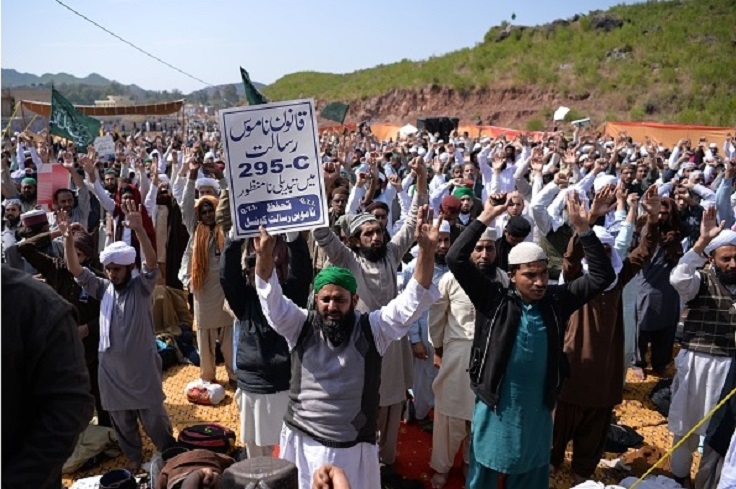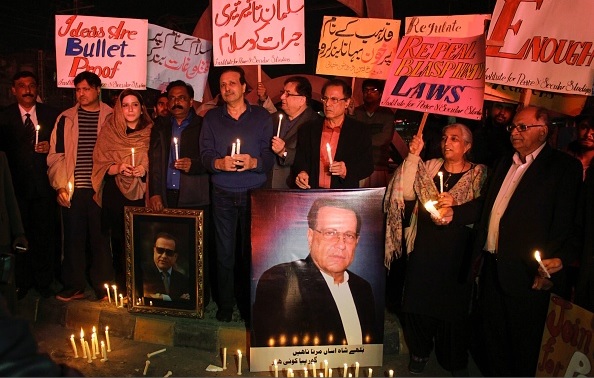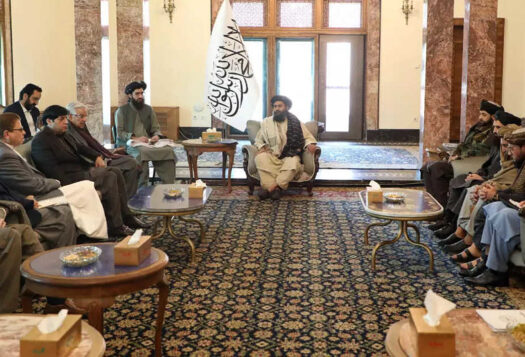
Religious groups and political parties have sharply increased their street power in Pakistan over the past few decades. While wielding this influence, they have increasingly begun using blasphemy laws as a means of restricting the ability of dissenters to challenge accepted religious discourse. It is commonly perceived that Pakistan’s blasphemy laws have been used to further marginalize the minority Christian population in the Muslim majority country. In addition, in a worrying trend for religious freedom in Pakistan, the blasphemy law has been misused in several cases to settle scores based on personal, political, or social motivations, not only against religious minorities but also the Sunni Muslim majority. This suggests that, in Pakistan, no one, regardless of prestige and authority, religious or otherwise, is particularly safe if accused of committing blasphemy.
The Blasphemy Law: Evolution and Misuse
In a worrying trend for religious freedom in Pakistan, the blasphemy law has been misused in several cases to settle scores based on personal, political, or social motivations.
Much has changed in Pakistan since its founder, Muhammad Ali Jinnah, declared freedom of action for people belonging to all religions. At that time, Jinnah and others endeavored to create a modern and open-minded Islamic society. However, subsequent tensions between radical Islamists and reformer Islamists – as old as the country itself – have accelerated political upheaval. With the military ruling Pakistan and General Zia promoting Islamization, it gave credibility and public space to religious groups, leading to the Islamization of large portions of the state’s governing apparatus. As the political scenario in Pakistan oscillated between coups and the imposition of martial law, the influence of radical religious parties in constitutional amendments and state laws steadily increased. Since then, political parties have used radical religious groups to strengthen their election campaigns.
Under Zia-ul-Haq, the scale of Islamization and efforts at converting Pakistan into a theocracy were unparalleled in Pakistan’s political history, antithetical to the pluralistic, progressive, and non-theocratic vision of its founder. The blasphemy laws that were introduced in the subcontinent by British colonial rule in the 19th century, with the aim to control religious violence, were later amended by General Zia, which effectively began the Sharisation of Pakistan’s governance structure. This also enabled radical Islamists and extremist elements to invoke these laws to strengthen intolerance in society. From then until now, blasphemy laws in the country have remained unchanged.
The unquestionable nature of these laws has strengthened the “mullah mafia” in Pakistan to the extent that the blasphemy law has now become a power tactic through which religious extremist groups manipulate, mobilize, and control the common masses by exploiting their religious sentiments.
Pakistan has the second strictest blasphemy law in the world. Section 295C of the Pakistan Penal Code prescribes that defiling the name of the Prophet could trigger the death penalty and the accused could be arrested without any substantial evidence. The unquestionable nature of these laws has strengthened the “mullah mafia” in Pakistan to the extent that the blasphemy law has now become a power tactic through which religious extremist groups manipulate, mobilize, and control the common masses by exploiting their religious sentiments. Estimates suggest that 1,274 people have been charged under Pakistan’s blasphemy laws between 1986, when the law was put into the Constitution, and 2010.

Cases of Religious Intolerance
Salman Taseer, former governor of Pakistan’s Punjab province, was a vocal opponent of religious extremism and supported repealing Pakistan’s blasphemy law, which he referred to as “black law” on occasion. After speaking out against charges of blasphemy made against Aasia Bibi, a Christian woman who was sentenced to death over those charges, Taseer was labeled a traitor to Islam by hardliner Muslim extremists.
One of these very extremists would eventually take Taseer’s life – Malik Mumtaz Qadri, Taseer’s guard, assassinated the governor in 2011. Qadri later confessed that he was inspired to do it by rousing speeches and prayers delivered by clerical leaders. Even before his murder, Taseer’s anti-blasphemy stance was unbearable to many in Pakistani society since it brought up various intersectional issues that were ethnic, sectarian, religious, class-based, economic and nationalist in nature. Some of those who found Taseer’s rhetoric about blasphemy law disturbingly secular celebrated his death, hailing Qadri as a hero. Taseer’s assassination reveals the far-reaching impact of Pakistan’s blasphemy laws, where the inability to prove the accusation of blasphemy as false can lead to the common man taking matters into his own hands.
Taseer’s assassination reveals the far-reaching impact of Pakistan’s blasphemy laws, where the inability to prove the accusation of blasphemy as false can lead to the common man taking matters into his own hands.
Similarly, Junaid Jamshed, a singer turned religious preacher, was accused of blasphemy in 2014 by a Sunni Muslim group after he delivered a controversial sermon about Prophet Muhammad’s wife, Aisha. As the media has pointed out, Jamshed’s case was unusual because at the time, he was a well-known and wealthy Muslim preacher, belonging to the influential religious group, Tablighi Jamaat. Sunni Tehreek, the Jamaat’s religious rival, launched a sit-in in Karachi to demand Jamshed’s arrest for blasphemy. Although Jamshed issued an apology, continuous death threats forced him to leave the country. It was only after the intervention of Maulana Tariq Jameel, the head of Tablighi Jamaat, that Jamshed was able to safely return. However, the stigma of blasphemy would remain attached to Jamshed until his death in 2016.
The misuse of the blasphemy law in Pakistan has been most recently exemplified by the case of Mashal Khan, a 23-year-old student at Abdul Wali Khan University, Mardan, who was mercilessly lynched by a mob of other students. Their justification: accusations of Khan having committed blasphemy in April 2017. Khan was claimed to have published blasphemous material online, which police would later discover was unfounded. Investigations further revealed that Khan had disagreements with university management, and blasphemy allegations were made against him to settle personal scores. The most important takeaway from Khan’s death remains the fact that just the allegation of blasphemy compelled his peers to fatally turn on him – this speaks to the level of exploitation of religious identity that the existence of these laws in Pakistan permits.
Conclusion
There is a deep divide within Pakistani society between religious extremists and secular leaders. The Pakistani government’s resistance to dealing with religious extremism only adds to the current threat levels associated with blasphemy, both alleged and confirmed.
In the aggregate, these cases establish that there have been personal, political, or social motivations behind many of the accusations of blasphemy law violations in Pakistan. From these instances, it can be argued that it is not simply religious impetus that triggers this suspect judicial mechanism. There is a deep divide within Pakistani society between religious extremists and secular leaders. The Pakistani government’s resistance to dealing with religious extremism only adds to the current threat levels associated with blasphemy, both alleged and confirmed. To overcome such ruptures, the paramount challenge for Pakistan at the moment is to free itself from fundamentalism. It is imperative to focus on authenticity with the application of the blasphemy law so no one can be accused without substantial proof. In the words of Bilal Hayee, “If a law curtails or endangers the enjoyment of certain inviolable rights such as right to life, liberty, and freedom of thought, conscience and religion without providing any major benefit to the subjects, it is not only legitimate but incumbent upon the concerned State to review and amend the legislation to prevent the violation of such critical human rights.” Until this is done, the political power of radical religious elements in Pakistan will continue to prey on the religious identity of the majority, compromising the ideals of freedom and tolerance idealized by the founding fathers of Pakistan.
***
Image 1: Aamir Qureshi/AFP via Getty Images
Image 2: Arif Ali/AFP via Getty Images


